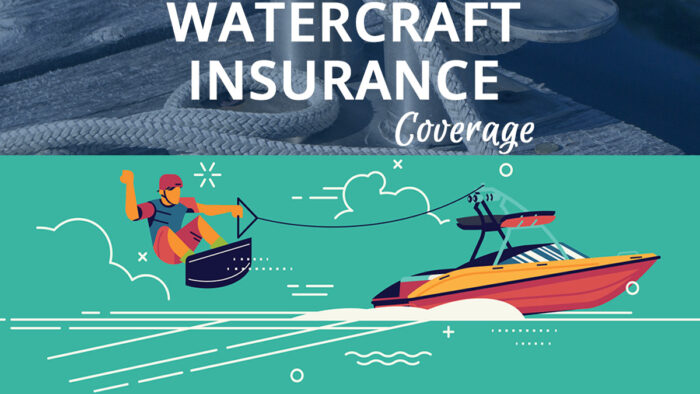Watercraft insurance is a crucial aspect of owning and operating any type of water vessel, whether it be a boat, yacht, jet ski, or any other watercraft. This specialized insurance coverage provides financial protection against a range of risks that can arise while out on the water, such as accidents, damage to the vessel, liability for injuries or property damage to others, theft, and more.

Boat owners need to understand the nuances of watercraft insurance to ensure they adequately protect themselves and comply with legal requirements.
We will delve into the intricacies of watercraft insurance, exploring the different types of coverage available, factors that influence premiums, common exclusions to be aware of, and tips for selecting the right policy for your specific needs.
Whether you are a seasoned boat owner or considering purchasing your first watercraft, having a comprehensive understanding of watercraft insurance will empower you to make informed decisions to safeguard your investment and enjoy peace of mind on the open waters.
Why is Watercraft Insurance Important?
Watercraft insurance encompasses boat, yacht, and personal watercraft insurance, providing coverage for vessels powered by motors with at least 25 mph of horsepower. Although not mandatory in many states, experts highly recommend it due to the financial protection it provides against damages, theft, liability for injuries or property damage to others, and legal expenses in case of accidents.
Boat owners often opt for watercraft insurance to comply with loan requirements and marina agreements. This insurance includes various types of coverage, such as physical loss or damage to the vessel, theft, towing, and liability for bodily injury to others.
The importance of watercraft insurance lies in safeguarding one’s investment against potential risks on the water and ensuring peace of mind and financial security in case of unforeseen events. It is a prudent choice, even for less valuable crafts, due to the potential high costs associated with legal defense after an accident.
What Does Watercraft Insurance Cover?
When dealing with watercraft insurance, understanding precisely what your policy covers and excludes is crucial. Knowing the ins and outs of your insurance coverage can help you make informed decisions and protect your investment in your boat.
Here’s what it typically cover:
- Damage to the boat itself, including the hull and any attached equipment, such as anchors, outboard motors, and onboard electronics.
- Liability for accidents involving your boat, including injuries to other people and damage to their property.
- Medical payments for injuries to you and your passengers, regardless of fault.
- Loss of personal belongings on the boat, such as fishing equipment, clothing, and sporting gear.
- Towing and salvage in case the boat gets stranded.
- Pollution liability in case of an oil or fuel spill.
What It Doesn’t Cover
There are a few common exclusions in this insurance policy. These may include:
- Wear and tear, including normal aging, weathering, and corrosion.
- Negligence or misuse of the boat, such as failing to maintain it properly or using it in a dangerous manner.
- Theft or loss due to fraud, dishonesty, or illegal activities.
- Damage caused by war, riots, or civil unrest.
- Damage or loss while the boat is being used for business purposes.
- Any liability that is covered by another insurance policy, such as your homeowner’s policy.
It’s important to remember that watercraft insurance policies can vary from one company to the next, so it’s always a good idea to read your policy carefully and speak to your insurance agent if you have any questions.
Do I Need Watercraft Insurance?
You should consider watercraft insurance for your boat or watercraft, as it provides essential coverage for damages, injuries, and liabilities that may arise while on the water. Without adequate insurance, you could face significant out-of-pocket expenses in case of accidents, damages to your boat, or liabilities for injuries caused to others.
It typically covers bodily injury, property damage, medical payments, damage to another craft or dock, and liability for negligence-related injuries or damages. It is crucial to have a comprehensive policy tailored to your specific needs and vessel type to ensure you are adequately protected against unforeseen events on the water.
Considering the potential risks and costs associated with boating accidents and damages, having watercraft insurance is a prudent decision to safeguard your investment and enjoy worry-free boating experiences.
How Much Does Watercraft Insurance Cost?
Based on various factors such as the watercraft’s value, age, type, and features, watercraft insurance premiums can range from $100 to $5,000 per year. Typically, the annual premium is about 1-2% of the boat’s market value.
Factors influencing the cost include the watercraft’s value, age, type, and features. For example, premiums for different boats can vary significantly: a 1977 Boston Whaler 13 Sport may cost $100 per year, while a 2007 Carver Yacht Cruiser could cost $3,373 per year.
To determine the exact cost of your watercraft insurance policy, it is essential to consider these factors and work with a reputable insurance agent who can provide tailored coverage at a competitive price.
FAQs
Is watercraft insurance mandatory?
While watercraft insurance is not mandatory in all states, it is highly recommended to have coverage to protect yourself, your passengers, and your investment in case of accidents or unforeseen events on the water.
Can I customize my boat insurance policy?
Yes, many insurers offer customizable options for boat insurance policies. You can tailor your coverage based on your specific needs, preferences, and budget to ensure you have adequate protection while on the water.
Are there discounts available for watercraft insurance?
Some insurers offer discounts for factors like completing a boating safety course, having multiple policies with the same insurer, installing safety equipment on your watercraft, or having a claims-free history. It’s worth exploring these options to potentially lower your insurance costs.
What should I do if I need to make a claim on my watercraft insurance?
In case of an incident requiring a claim, promptly contact your insurance provider to report the details and follow their instructions for filing a claim. Provide all necessary documentation and information to facilitate the claims process efficiently.


